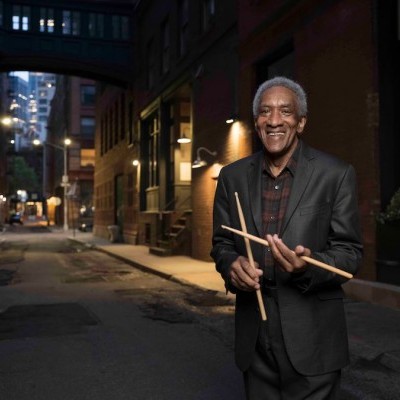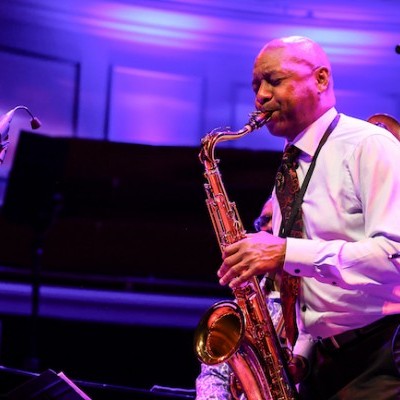Jun 3, 2025 11:25 AM
In Memoriam: Al Foster, 1943–2025
Al Foster, a drummer regarded for his fluency across the bebop, post-bop and funk/fusion lineages of jazz, died May 28…

On Kuba Więcek’s debut, Another Raindrop, listeners can find influences as far flung as the trip-hop feel of Massive Attack and folkloric dance rhythms.
(Photo: Filip Błażejowski/Warner Music Poland)In May 2015, Warner Music Group acquired the massive catalog of Polskie Nagrania, the old state-run Polish label of the Communist era that amassed about 40,000 tracks in every conceivable genre of music between 1956 and 1989.
The endeavor went bankrupt, thanks in part to poorly anticipating technological shifts: As the compact disc was becoming ascendant, the company invested money in its own vinyl-pressing plant. During its initial run, the label was arguably the most important outlet for Poland’s vibrant jazz scene, and by the time it stopped producing new titles, the Polish Jazz series had dropped 76 titles, several of which are undeniable classics of European jazz, such as Krzysztof Komeda’s epochal 1966 recording Astigmatic and a handful of early statements by the brilliant trumpeter Tomasz Stańko.
Last year, Warner Music launched an ambitious reissue program overseen by the veteran Polish jazz journalist Pawel Brodowski, long-time editor of Jazz Forum. According to Piotr Kabaj, the president of Warner Music Poland’s management board, “We wanted to present the history of Polish jazz not only in Poland, but worldwide,” noting that the extensive new liner notes are in both Polish and English. Every reissue is available both on CD—for most of the catalog, this is the first time the music has been made available in the format—and 180-gram vinyl.
As impressive as the reissue program is, the relaunch of the label is doubly notable because new recordings also are being produced. Two such titles were released last year, including Polish Jazz—Yes!, by veteran saxophonist Zbigniew Namysłowski, who appeared on many titles in the label’s history under his own name, as well as a member of the Polish Jazz Quartet and as sideman for the likes of Komeda and Stańko. But the imprint also demonstrated a commitment to the future with Another Raindrop, the debut from a 23-year-old alto saxophonist named Kuba Więcek, who was born six years after the Polish Jazz series came to a halt.
“To be honest, I didn’t know so much of them,” he said when asked about the influence the label had on him, although he added that the sound of Komeda and Stańko are in his blood. He only started playing jazz at age 17, and soon after finishing high school moved to Copenhagen to study at the prestigious Rhythmic Conservatory, where fellow students introduced to him all sorts of other sounds. But it was there that he fell in love with American jazz, absorbing the atmosphere that once brought the likes of Dexter Gordon and Kenny Drew to settle there. It also led to an admiration for contemporary artists like Jim Black, Chris Speed and Chris Cheek.
There are plenty of non-jazz influences on his album—cut with the veteran rhythm section of bassist Michał Baranski and drummer Łukasz Żyta—from the trip-hop feel of Massive Attack on “Szkodnik” to the folkloric dance rhythms in “Forest Creatures’ Night Ritual.”
“I strongly believe that a concert and CD experience tell different stories, so I don’t want to make the album the way we play live,” Więcek said. “Also, I like listening to songs that are [just] long enough.’”
Indeed, most of the 13 tracks on Another Raindrop are notable for their concision, and he said that a tune like the three-minute swinger “The Wheels You Can’t Stop (Although You Try)” usually expands to a 20-minute workout live.
According to label product manager Anna Zajac, “Polish Jazz is not only a label, but it’s synonymous with the best quality of music. It’s extremely hard to choose the right artists who bring the series back to life after 27 years. Because of that, it’s not the decision of one person. We have a group of opinion-forming jazz lovers outside and inside the company, and the final word belongs to Kabaj and Brodowski.”
The series recently issued an album by pianist Piotr Wyleżoł, featuring the American saxophonist Dayna Stephens, and on the horizon is a double album by the Ptaszyn Wróblewski Sextet, which deals with Komeda’s music. DB

Foster was truly a drummer to the stars, including Miles Davis, Sonny Rollins and Joe Henderson.
Jun 3, 2025 11:25 AM
Al Foster, a drummer regarded for his fluency across the bebop, post-bop and funk/fusion lineages of jazz, died May 28…

“Branford’s playing has steadily improved,” says younger brother Wynton Marsalis. “He’s just gotten more and more serious.”
May 20, 2025 11:58 AM
Branford Marsalis was on the road again. Coffee cup in hand, the saxophonist — sporting a gray hoodie and a look of…

“What did I want more of when I was this age?” Sasha Berliner asks when she’s in her teaching mode.
May 13, 2025 12:39 PM
Part of the jazz vibraphone conversation since her late teens, Sasha Berliner has long come across as a fully formed…

Roscoe Mitchell will receive a Lifetime Achievement award at this year’s Vision Festival.
May 27, 2025 6:21 PM
Arts for Art has announced the full lineup for the 2025 Vision Festival, which will run June 2–7 at Roulette…

Benny Benack III and his quartet took the Midwest Jazz Collective’s route for a test run this spring.
Jun 3, 2025 10:31 AM
The time and labor required to tour is, for many musicians, daunting at best and prohibitive at worst. It’s hardly…